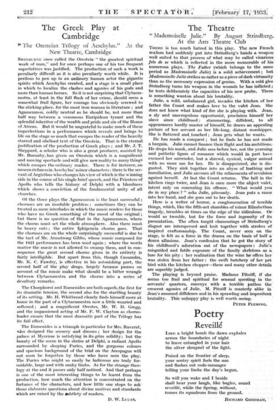The Theatre
"Mademoiselle Julie." By August Strindberg. At the Arts Theatre Club THERE is too much hatred in this play. The new French realism had suddenly put into Strindberg's hands a weapon well suited to that process of what may be called vicarious felo de se which is reflected in the more memorable of his numerous plays. The Father (which belongs to the same period as Mademoiselle Julie) is a solid achievement ; but Mademoiselle Julie strikes us rather as a piece of dark virtuosity than as the necessary expression of genius. With a cold. glee Strindberg turns his weapon in the wounds he has inflicted ; he tests deliberately the capacities of his new probe. There is something wanton about his brutality.
Julie, a wild, unbalanced girl, invades the kitchen, of her father the Count and makes love to the valet Jean. She does not know what kind of fire she is playing with. Jean, a sly and unscrupulous opportunist, proclaims himself her slave since childhood : stammering, diffident, to all appearances hardly master of himself, he draws an appealing picture of her servant as her life-long, distant worshipper. She is flattered andtouched; Jean gets what he wants.
He has made a conquest ; but he finds he has not made a bargain. Julie cannot finance their flight and his ambitions. He drops his mask, and Julie sees before her, not the yearning and pathetic figure of romance which would in part have excused her surrender, but a shrewd, cynical, vulgar animal with no more use for her. Ile is disappointed, she is dis- gusted. They sink together into an abyss of loathing and humiliation, and Julie savours all the refinements of revulsion against herself. At last the Count returns. The bell in the' kitchen rings twice, and Jean is once more the abject valet, intent only on concealing his offence. "What would you do in my place ? " asks Julie, piteously. Jean puts a razor into her hand, and she goes out to her death.
Here is a welter of horror, a conglomeration of terrible
things, which, like the fifth-act shambles of minor Elizabethan tragedy, trembles at times on the edge of the ridiculous. Or - would so tremble, but for the force and ingenuity of its presentation. The often turgid clamourings of Strindberg's disgust are interspersed and knit together with strokes of inspired craftsmanship. The Count, never seen on the stage, is felt as a force in the drama on the basis of half a dozen allusions. Jean's confession that he got the story of his childhood's adoration out of the newspapers : Julie's misguided and futile exposure of the family skeletons as a lure for his pity : her realization that the wine he offers her was stolen from her father : the swift butchery of her pet bird with the kitchen chopper—these and many other details are superbly judged.
The playing is beyond praise. Madame Pito6ff, if she seems too frail and spiritual for sensual questing in the servants' quarters, conveys with a terrible pathos the crescent agonies of Julie. M. Pitoeft is masterly alike in Jean's assumed diffidence and in his sprawling and-impenitent brutality. This unhappy play is well worth seeing.
Force FLEXING.






































 Previous page
Previous page